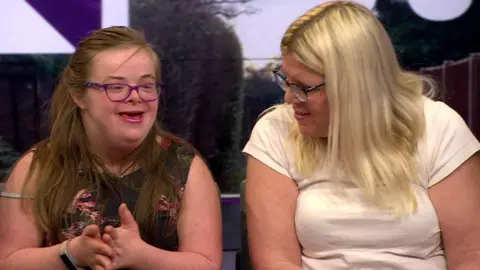Northern Ireland abortion law changes proposed by the DUP
 Science Photo Library
Science Photo LibraryThe DUP has proposed a new law to prevent abortions being carried out in NI in cases of non-fatal disabilities.
NI's abortion laws changed significantly last year following legislation passed at Westminster.
There is no time limit for terminations when there is a "substantial risk" a fetus would suffer a severe mental or physical impairment.
Campaigners have argued the law allows abortions without time limit for conditions such as Down's syndrome.
A private member's bill brought by Paul Givan, backed by disability rights campaign group Don't Screen Us Out, is seeking to overturn the law.
One high-profile activist involved in the campaign is Heidi Crowter, who has Down's syndrome.
She is also taking a separate legal action against the UK government regarding a similar element in the 1967 Abortion Act, which applies in Great Britain.
However, the UK government has said it is legally bound to provide "access to abortions in cases of severe fetal impairment, not only fatal fetal abnormalities".

In the Republic of Ireland, abortions are allowed in cases of fatal fetal abnormality, but this does not apply for conditions such as Down's syndrome.
Mr Givan's bill represents the first legislative attempt since devolution was restored in Northern Ireland to amend the abortion laws introduced by the UK government.
He said the legislation would not seek to amend the law for abortions in cases of fatal fetal abnormalities and that it was about removing discrimination against people with disabilities.
"This is an opportunity for people to come together and fight a prejudicial, discriminatory piece of legislation," he told the Good Morning Ulster programme.
"We have introduced laws called the Disability Act of 1995 and we have built upon that to place duties on public authorities and support people with disabilities.
"I believe that those rights - and these are human rights - ought to be conferred upon people before they are born and that is what this campaign is going to be about.
"I believe there is a majority of assembly members that agree with this, as does the majority of the public."

Sinn Féin called on Health Minister Robin Swann to commission the provision of abortion services without further delay.
"Our priority is to provide appropriate, modern and compassionate healthcare services for women across the island," a spokesperson said.
"The legislation enacted at Westminster in 2019 put a legal responsibility on the British secretary of state to ensure that the recommendations of the Cedaw (UN Committee on the Elimination of Discrimination Against Women) report are implemented in the north, and gives him the powers to make any necessary changes to the law in order for the north to comply with Cedaw.
"Therefore the DUP bill is going nowhere."
Paula Bradshaw, of the Alliance Party, challenged Mr Givan. She said checks and balances were already in place.
"If he [Mr Givan] thinks these terminations are taken lightly by a woman who has received such a devastating diagnosis, or a healthcare professional who has devoted their whole life to healthcare and supporting women, it is horrendously disrespectful," she said.
"I'm not pro-abortion, I'm pro-choice.
"A woman has to be supported when she's presented with this diagnosis to explore all options for managing the rest of her pregnancy."
'Morally wrong and unjustifiable'
The moderator of the Presbyterian Church in Ireland, Rev David Bruce, welcomed Mr Givan's bill and has encouraged "as many MLAs as possible" to give their backing.
"We vigorously opposed the imposition of abortion legislation by Westminster on Northern Ireland, as we believed at the time, as we continue to maintain today, that it would create the most extreme and most liberal abortion regime anywhere in these islands, which it has done," he said, in a statement.
Dr Bruce said that many aspects of the current legislation are "morally wrong and unjustifiable".
In a statement, the UK government said the law requires it to implement recommendations made by the UN Committee on the Elimination of Discrimination Against Women (Cedaw) report in 2018, including "providing access to abortions in cases of severe fetal impairment, not only fatal fetal abnormalities".
"While abortion remains a devolved issue, the assembly can only legislate in a way that remains compatible with Convention rights," it added.
"We remain of the firm view that the 2020 Abortion Regulations are compatible with our international obligations, including under the Convention on the Rights of Persons with Disabilities."
How did we get here?
In July 2019, MPs voted to decriminalise abortion in Northern Ireland and create new laws.
Stormont was not functioning due to a row between the main power-sharing parties.
A new framework for abortion services in NI was then drawn up by the Northern Ireland Office and took effect last March.
It made terminations legal in all circumstances within the first 12 weeks of pregnancy.
A 24-week limit would apply in situations where continuing a pregnancy would involve risk of injury to the woman's physical or mental health.
But there is no term limit in cases of fatal fetal abnormality where there is a substantial risk that the fetus would die or, if born, would suffer a severe mental or physical impairment.
Last year, the Stormont assembly supported a non-binding motion rejecting the laws.


Paul Givan has no memory of his great uncle Samuel but grew up listening to stories about him.
He had Down's syndrome and died at the age of 57.
For him, this move today is both personal and political as his bill - if successful - will allow MLAs to change part of Northern Ireland's new abortion laws, which were approved at Westminster while Stormont was in suspension.
The DUP have worked out their sums and believe the bill could secure the support of 75 of Stormont's 90 MLAs.
That calculation is based on a series of votes in the Stormont chamber last year when an amendment similar to this bill was proposed by Sinn Féin.
It was defeated at the time but Paul Givan believes with the support of his party this time and other anti-abortion MLAs it could get over the line.
But predicting outcomes in the Stormont chamber is a risky business and there is no guarantee the voting patterns will remain the same.
What is for sure is that we can expect some heated and emotive exchanges across the assembly floor and maybe a legal challenge in the courts.

The DUP is opposed to abortion, while Sinn Féin voted to change its stance in 2018 and supports it in most circumstances.
The SDLP, UUP and Alliance Party view abortion as a matter of conscience so it is up to individual MLAs how they vote on the issue.
How have the laws been working since they changed?
The new regulations came into force weeks after the first wave of the Covid-19 pandemic began.
Stormont's Department of Health said that the full commissioning of abortion services in NI would need to be discussed by the executive.
Some health trusts then started providing interim services, allowing early medical abortions within the first 10 weeks of pregnancy.
The latest figures from the Department of Health state that since the new abortion laws came into place on 31 March 2020, 1,091 notifications of terminated pregnancies have been received.
The British government has been providing funding to allow women from NI seeking abortion services to continue travelling to England.
